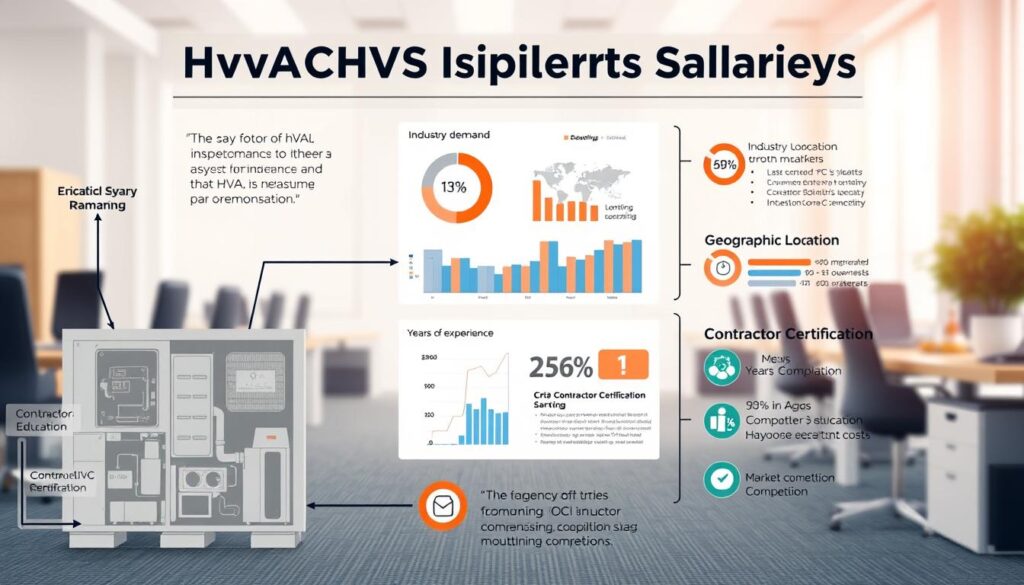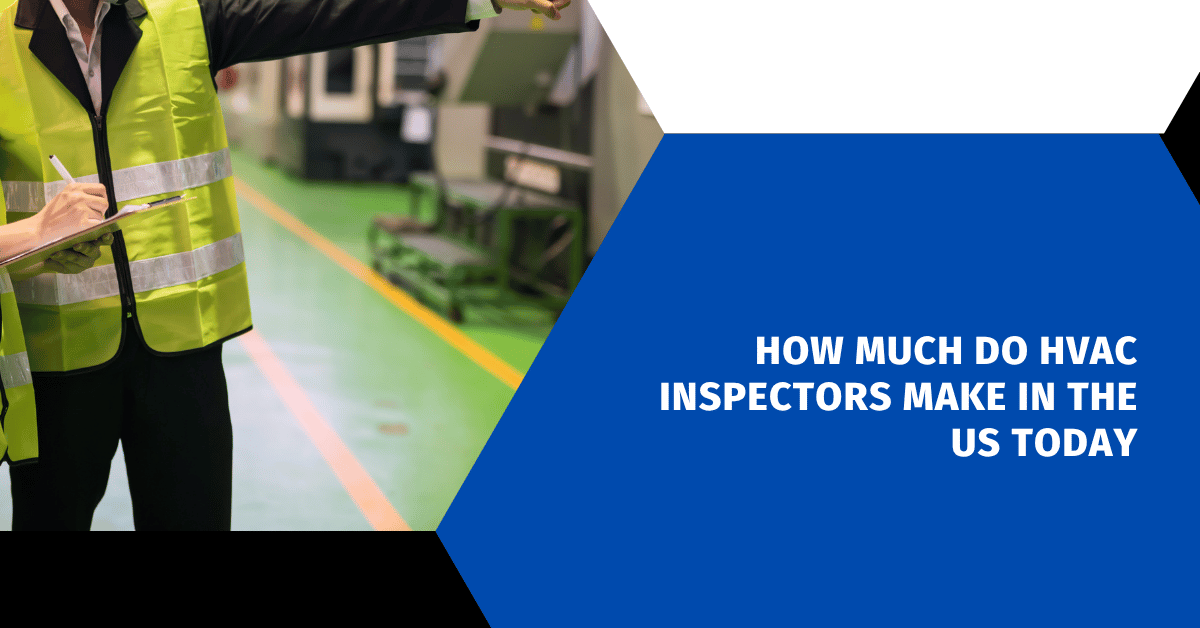Affiliate Disclosure
HVAC Guide Guys is a participant in the Amazon Services LLC Associates Program, an affiliate advertising program designed to provide a means for sites to earn advertising fees by advertising and linking to Amazon.
Ever wondered how much HVAC inspectors earn? The field of heating, ventilation, and air conditioning is more lucrative than you might think.

Exploring HVAC inspector salaries, you’ll find a career with great earning possibilities. The Bureau of Labor Statistics shows that HVAC inspectors earn a median of $62,000 a year. This makes it a sought-after job for technical experts.
Your ability to ensure systems are safe and efficient can lead to good pay. The salary for HVAC inspectors changes based on experience, where you work, and your area of focus. This means there are many ways to grow your career and increase your earnings.
Key Takeaways
- Median HVAC inspector salary is approximately $62,000 annually
- Earnings increase with specialized certifications
- Where you live greatly affects your income
- Technical skills lead to better pay
- This career offers stable work with chances for advancement
Table of Contents
Understanding the Role of HVAC Inspectors
An HVAC inspection career is dynamic and critical. It ensures building safety and efficiency. HVAC inspectors check heating, ventilation, and air conditioning systems. They make sure these systems meet safety and performance standards in homes and businesses.
HVAC inspectors play a key role in keeping people safe. They examine complex mechanical systems. Their job requires technical skills and attention to detail.
Key Responsibilities and Duties
HVAC inspectors have many important tasks. They need technical knowledge and precision:
- Examine building plans and blueprints for HVAC system compliance
- Inspect electrical and mechanical components for safety issues
- Verify installation meets national and local building codes
- Document system performance and any issues
- Recommend repairs or system improvements
Required Certifications and Licenses
To succeed in HVAC inspection, you need certain credentials:
- EPA Section 608 Certification
- State-specific HVAC inspector license
- International Association of Plumbing and Mechanical Officials (IAPMO) certification
- NATE (North American Technician Excellence) certification
Daily Work Environment
Your day as an HVAC inspector will mix office work and site visits. You’ll review documents, write reports, and inspect systems in various places. This includes homes, businesses, and industrial sites.
“An HVAC inspector’s expertise ensures the safety and efficiency of critical building systems.” – Professional HVAC Association
The HVAC inspection career is rewarding and challenging. It allows you to impact building safety and energy efficiency. It’s a technical profession that makes a difference.
Explore Our HVAC Shop
Looking for top-rated HVAC tools, parts, and accessories? Visit our shop and find the perfect solution for your needs.
Visit the ShopNational Average Salary Range for HVAC Inspectors
Exploring hvac inspection earnings shows a wide range of salaries across the United States. HVAC inspectors can earn between $38,000 and $100,000 a year. This depends on several important factors.
Your salary as an HVAC inspector can change based on a few key things:
- Where you live
- How long you’ve been working
- Any special certifications you have
- The industry you work in
Here’s a clear look at what HVAC inspectors usually make:
| Experience Level | Annual Salary Range |
|---|---|
| Entry-Level | $38,000 – $55,000 |
| Mid-Career | $55,000 – $75,000 |
| Experienced | $75,000 – $100,000 |
Those with advanced certifications and special skills can earn even more. Cities and areas with lots of construction projects often pay more to HVAC inspectors.
Your earning power grows a lot with more experience and ongoing learning.
Top-Paying States for HVAC Inspectors
Exploring hvac inspector compensation reveals top states with high pay. These regions offer salaries that can change your HVAC inspection career path.
Your earnings as an HVAC inspector depend on where you work. Some states offer much higher pay, making moving there worth it for many professionals.
California: The Golden State of HVAC Opportunities
California tops the list with an average salary of $91,510 for HVAC inspectors. The state’s strong construction, strict building codes, and need for energy-efficient systems lead to high pay.
Alaska: Unique Market with Premium Compensation
Alaska is close behind with an average salary of $90,260. Its harsh climate and unique infrastructure needs mean HVAC inspectors are in high demand, earning more.
Connecticut: Northeast’s HVAC Inspection Powerhouse
Connecticut is third with an average salary of $87,280. The state’s crowded areas, strict building rules, and focus on energy efficiency make it a great place for HVAC inspectors.
| State | Average Salary | Key Factors |
|---|---|---|
| California | $91,510 | High construction activity, energy regulations |
| Alaska | $90,260 | Extreme climate, specialized infrastructure |
| Connecticut | $87,280 | Dense population, strict building codes |
These states offer more than just high salaries. They provide unique work environments that can boost your HVAC inspection career and offer great growth chances.
Explore Our HVAC Shop
Looking for top-rated HVAC tools, parts, and accessories? Visit our shop and find the perfect solution for your needs.
Visit the ShopHow Much Do HVAC Inspectors Make Based on Experience
Your salary as an HVAC inspector can really grow as you get more experience. The more you know, the more you can earn. This is because your skills and knowledge increase over time.
At the start, HVAC inspectors make less money. Those new to the job usually earn between $35,000 and $45,000 a year. These early years are important for learning the basics and understanding what’s expected.
After 4-7 years, things get better. Your salary can jump to $50,000 to $65,000. This shows you’ve gained more skills and are seen as more reliable.
- Entry-level (0-3 years): $35,000 – $45,000
- Mid-career (4-7 years): $50,000 – $65,000
- Senior-level (8+ years): $70,000 – $95,000
For those with 8 or more years of experience, the pay is even higher. You could earn $70,000 to $95,000. This depends on your area, what you specialize in, and any extra qualifications you have.
“Continuous learning and skill development are key to maximizing your earning in HVAC inspection.” – Professional HVAC Career Guide
Keep learning and getting better at your job. Get more certifications and stay up-to-date with new tech. This will help you grow faster and earn more.
Career Growth and Advancement Opportunities
Your hvac inspection career offers many paths for growth and more money. As an HVAC inspector, you can turn your job into a rewarding journey. This is done by making smart career moves.
To advance in HVAC inspection, you need a plan and to keep learning. Your growth can go beyond just checking systems. There are many exciting areas to explore.
Moving into Management Positions
Experienced HVAC inspectors can move up to leadership roles. These roles can greatly increase your income. Some management positions include:
- Lead Inspector
- Department Supervisor
- Quality Control Manager
- Technical Training Coordinator
Starting Your Own Inspection Business
Entrepreneurial HVAC inspectors can earn a lot by starting their own services. This path needs:
- Getting the right business licenses
- Creating a strong marketing plan
- Building a good client base
- Investing in top-notch equipment
Specialization Options
Choosing a specific HVAC inspection area can really boost your earnings. Consider these special areas:
| Specialization | Potential Income Increase |
|---|---|
| Commercial HVAC Systems | 25-40% Higher Rates |
| Energy Efficiency Inspections | 30-45% Premium Pricing |
| Green Building Certifications | 35-50% Specialized Fees |
By focusing on your skills and exploring different career paths, you can make your hvac inspection job very rewarding. It can also be very profitable.
Explore Our HVAC Shop
Looking for top-rated HVAC tools, parts, and accessories? Visit our shop and find the perfect solution for your needs.
Visit the ShopFactors Affecting HVAC Inspector Salaries

Knowing what affects hvac inspector wages can help you plan your career. The HVAC inspection pay scale changes a lot. This is because of many important factors that can really change how much you earn.
Where you live is a big factor in your salary. Cities usually pay more than rural areas. For example, big cities with lots of building and industry offer better pay for HVAC inspectors.
- Education level directly impacts your earning
- Having extra certifications can increase your wages
- Special training makes you more valuable
Having professional certifications really matters. Inspectors with extra skills like energy efficiency or advanced training can earn more.
The demand for your skills also affects your pay. Places with lots of building or strict energy rules need skilled HVAC inspectors. Things like the economy, building projects, and new tech also change salaries.
- How long you’ve been working
- How skilled you are
- The local job market
- What special areas you work in
Being able to keep up with new tech and skills is key. It can really help your career and pay in HVAC inspection.
Commercial vs Residential HVAC Inspection Income
Exploring hvac inspection earnings shows the importance of knowing the commercial and residential markets. Each has its own opportunities and challenges for HVAC inspectors.
Commercial HVAC inspections usually bring in more money than residential ones. This is because commercial systems are bigger and more complex. This makes them more profitable for skilled inspectors.
Commercial Sector Earnings Breakdown
In the commercial market, you can earn a lot more. Big projects often include:
- Complex multi-unit system inspections
- Comprehensive building assessments
- Long-term maintenance contracts
| Inspection Type | Average Fee Range | Frequency |
|---|---|---|
| Small Commercial Building | $500 – $1,500 | Quarterly |
| Large Corporate Facility | $2,000 – $5,000 | Bi-Annual |
| Industrial Complex | $3,500 – $7,500 | Annual |
Residential Market Earnings
Residential hvac inspection earnings might seem lower. But, the volume and efficiency can add up to a good income. Residential inspections usually cost between $250 and $500 per job. There’s also the chance for repeat business and referrals.
“Successful HVAC inspectors understand that diversifying between commercial and residential markets maximizes overall earning. – HVAC Industry Expert
Your strategy should be to become good at both sectors. This way, you can have more flexibility and income streams in your hvac inspector compensation.
Explore Our HVAC Shop
Looking for top-rated HVAC tools, parts, and accessories? Visit our shop and find the perfect solution for your needs.
Visit the ShopAdditional Revenue Streams for HVAC Inspectors

As an HVAC inspector, you can earn more than just from inspections. By exploring different ways to make money, you can increase your income. This makes your financial situation more stable.
One great way to earn more is by doing energy audits. More people want to save energy, which means they need your help. These audits can really boost your earnings.
- Energy efficiency consulting
- System performance evaluations
- Sustainability recommendations
Teaching and training is another good way to make money. You can use your skills to:
- Teach workshops for homeowners
- Train new HVAC professionals
- Make online courses and content
Consulting is also a great option. You can help with HVAC system design and upgrades. This makes you an expert and brings in more money.
Your technical knowledge becomes a valuable asset when transformed into educational and consulting services.
By diversifying, HVAC inspectors can have more than one way to earn. This ensures they stay financially stable and grow in their careers.
Education and Training Requirements
To start a career in HVAC inspection, you need a solid educational plan. A high school diploma is the first step. But, to become a skilled HVAC inspector, you’ll need to explore various educational paths. These can greatly affect your salary.
Your journey to becoming an HVAC inspector includes several important steps:
- High school diploma or equivalent
- Vocational training programs
- Associate degree in HVAC technology
- Professional certification courses
Technical schools and community colleges offer HVAC programs. These programs last from six months to two years. They teach you about:
- Refrigeration systems
- Electrical fundamentals
- Climate control technologies
- Safety protocols
Apprenticeships are also key for gaining practical skills. Many employers look for candidates with field experience. You can get this through apprenticeships that last 2-5 years.
| Education Level | Typical Duration | Potential Salary Impact |
|---|---|---|
| High School Diploma | 4 years | Entry-level positions |
| Vocational Certificate | 6-12 months | Intermediate roles |
| Associate Degree | 2 years | Advanced positions |
| Bachelor’s Degree | 4 years | Management opportunities |
Getting certified by organizations like NATE (North American Technician Excellence) can boost your skills. It can also increase your earning power in HVAC inspection.
Explore Our HVAC Shop
Looking for top-rated HVAC tools, parts, and accessories? Visit our shop and find the perfect solution for your needs.
Visit the ShopJob Market Outlook and Industry Trends
The HVAC inspection job market looks bright for those looking for a stable career. The Bureau of Labor Statistics shows steady growth for construction and building inspectors, including HVAC specialists.
Knowing about hvac inspector wages and job openings is key. The field is changing fast because of new tech and energy standards.
Employment Growth Projections
Here are some important points about HVAC inspection jobs:
- Projected 3% growth rate between 2019-2029
- More need for energy-efficient building checks
- More construction and renovation work
Emerging Technologies Impact
New tech is changing HVAC inspection. Cutting-edge diagnostic tools and new ways to inspect are opening up new paths:
- Drone-based aerial checks
- AI-powered thermal imaging
- Smart sensor diagnostic tech
Staying up-to-date with these changes will help your career. Those who keep learning and use new tech will lead the way in this field.
The future of HVAC inspection belongs to those who can blend traditional expertise with innovative technological skills.
Conclusion
Exploring the earnings of HVAC inspectors shows a promising career path. You can earn well, from entry-level to specialized roles. Salaries vary based on experience and sector.
Your success depends on learning and keeping up with new tech. Getting advanced certifications and staying updated can boost your value. States like California, Alaska, and Connecticut offer great pay for skilled workers.
The HVAC inspection field offers many career paths. You can move up to management, start your own business, or focus on new tech. Your dedication to learning and understanding HVAC systems is key to success.
With more demand for HVAC inspectors, your career choice can be rewarding. Focus on education, certification, and skill improvement. This will help you earn well and make a difference in the industry.

